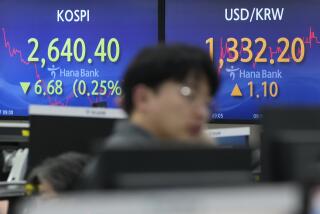Investor Confidence Waning : Tokyo Market Rise May Be Ending
- Share via
TOKYO — Tokyo’s high-flying stock market, the richest in the world by market value, may be about to go into a slide, a growing number of pessimistic brokers believe.
Rising U.S. interest rates and inflation, the unresolved Third World debt crisis and fading expectations of further cuts in Japanese interest rates are sapping investor confidence.
Analysts from some of Japan’s top securities houses, until now almost universally optimistic, are predicting sharp downturns in stock prices.
Even Nomura Securities, the world’s biggest brokerage, while dismissing talk of a market collapse, sees most share prices moving sideways for the next two months, a Nomura broker said.
“We have experienced a long, strong market upswing, so people are becoming concerned that share prices may have risen too high,” said Takaaki Yoda, equities research manager at Daiwa securities.
Yoda predicted the closely-watched 225-share Nikkei-Dow Jones market index could shed up to 10% in the coming two months.
The market gained 50.05 points Monday to close at 24,582.77 with investors still in a buying mood encouraged by recent steadiness of the yen-dollar exchange rate. The index has gained 1,163 points in the last four trading sessions.
Analysts, however, said the widening differential in American and Japanese interest rates caused by rate increases in the United States have made chances for further cuts in the 2.5% discount rate here look more remote.
“If falling interest rates begin to bottom out in Japan, then this would definitely be bad for the market,” Yoda said.
Successive cuts in the discount rate have diverted savings of cash-laden corporations and individuals from bank deposits to stock investment, helping propel the Tokyo exchange to its present position as the richest stock market in the world.
Mounting fear of inflation in the United States, which has steered Wall Street’s stock exchange into a sluggish phase, is also casting gloom onto the Japanese share market.
“Japan will catch inflation from the United States,” said Kazuhisa Okamoto, chief investment and research analyst at Nikko Securities. “International commodity prices are rising and Japan cannot help but import some of this inflation.”
Inflation is an age-old bugbear of stock markets as it erodes the real value of investments and traditionally triggers rising interest rates.
Inflation worries have been whipped up further by reports that the amount of money moving through the Japanese economy rose a dramatic 9.8% in April from a year earlier.
Adding to such misgivings, doubts over the health of international banking deepened last week after the biggest U.S. banking group, Citicorp, announced it was adding $3 billion to a fund covering risky loans to Third World countries. The news triggered the second biggest one-day share selloff in the Tokyo exchange’s history as the Citicorp move reinforced fears here over payment problems by Third World debtor nations. Japan is the world’s largest creditor nation.
“The danger comes from an extended system of inter-bank lending. You don’t know if the money you are lending to banks is going to unreliable Third World recipients,” said Nobuyoshi Kobayashi, analyst at Nomura.
Any further stirrings of doubt on Third World debt repayment would almost certainly trigger selling of bank shares, which represent almost 20% of the Tokyo market’s value, analysts agreed.
Mindful of these factors, foreign investors have made clear their attitude to the Tokyo market by consistently selling more Japanese stocks than they bought over the last 11 weeks.
More to Read
Inside the business of entertainment
The Wide Shot brings you news, analysis and insights on everything from streaming wars to production — and what it all means for the future.
You may occasionally receive promotional content from the Los Angeles Times.










